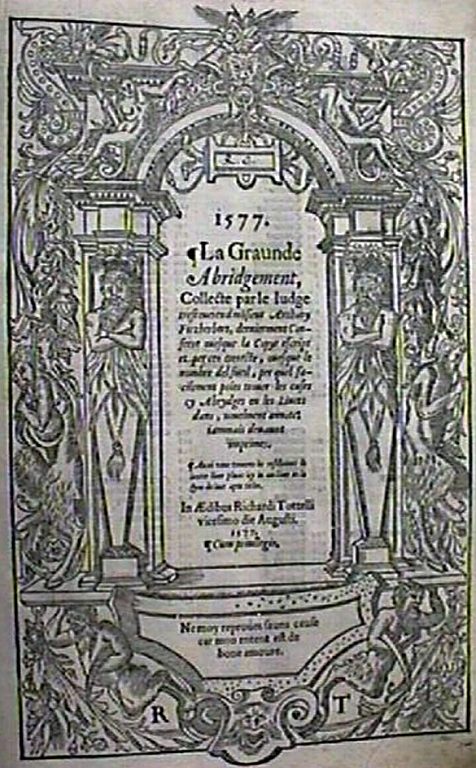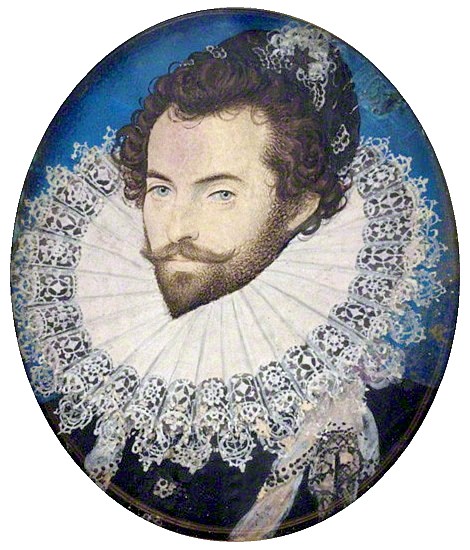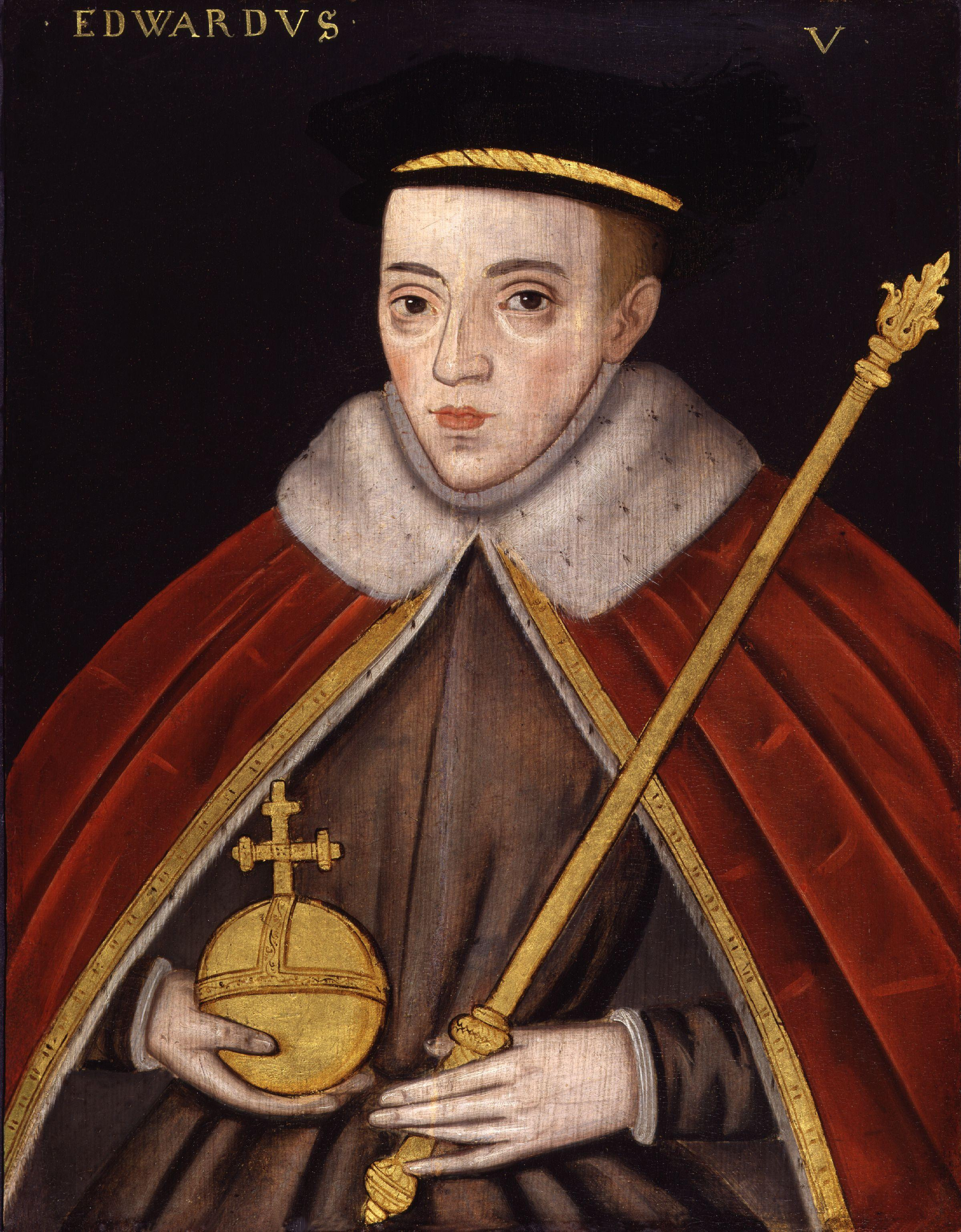|
Year Books
The Year Books are the earliest law reports of England. This name for the later collections of these reports is of modern origin. Substantial numbers of manuscripts circulated during the Late Middle Ages, containing reports of pleas heard before the Common Bench. In the sixteenth century versions of this material appeared in print form. These publications constituted the earliest legal precedents of the common law. They are extant in a continuous series from 1268 to 1535, covering the reigns of King Edward I to Henry VIII. The language of the original manuscripts and editions was either Latin or Law French. Maitland and others have considered that the medieval manuscripts were compiled by law students, rather than being officially sanctioned accounts of court proceedings. The best-known printed version is the so-called "Vulgate" edition, which appeared in a series of volumes between 1678 and 1680, and which became the standard edition consulted by practising lawyers. More re ... [...More Info...] [...Related Items...] OR: [Wikipedia] [Google] [Baidu] |
Pleas Of The Crown
In law, a plea is a defendant's response to a criminal charge. A defendant may plead guilty or not guilty. Depending on jurisdiction, additional pleas may be available, including ''nolo contendere'' (no contest), no case to answer (in the United Kingdom), or an Alford plea (in the United States). Under common law systems, a defendant who pleads guilty will be convicted if the court accepts the plea. The court will then determine and impose a sentence. Plea bargaining involves discussions between the prosecutor and defendants to reach an agreement for a guilty plea in exchange for a more lenient punishment. In civil law jurisdictions, a confession by the defendant is treated like any other piece of evidence. A full confession does not prevent a full trial or relieve the prosecutor from presenting a case to the court. Types of plea The most common types of plea are "guilty" and "not guilty". In some legal systems pleading guilty can result in a more lenient punishment for th ... [...More Info...] [...Related Items...] OR: [Wikipedia] [Google] [Baidu] |
Edward Coke
Sir Edward Coke ( , formerly ; 1 February 1552 – 3 September 1634) was an English barrister, judge, and politician. He is often considered the greatest jurist of the Elizabethan era, Elizabethan and Jacobean era, Jacobean eras. Born into an upper-class family, Coke was educated at Trinity College, Cambridge, before leaving to study at the Inner Temple, where he was called to the Bar on 20 April 1578. As a barrister, he took part in several notable cases, including ''Slade's Case'', before earning enough political favour to be elected to Parliament, where he served first as Solicitor General for England and Wales, Solicitor General and then as Speaker of the House of Commons (United Kingdom), Speaker of the House of Commons. Following a promotion to Attorney General for England and Wales, Attorney General he led the prosecution in several notable cases, including those against Robert Devereux, 2nd Earl of Essex, Robert Devereux, Walter Raleigh, Sir Walter Raleigh, and the Gun ... [...More Info...] [...Related Items...] OR: [Wikipedia] [Google] [Baidu] |
Nominate Reports
The nominate reports, also known as nominative reports, named reports and private reports, are the various published collections of Law report, law reports of cases in English courts from the Middle Ages to the 1860s. Most (but not all) are reprinted in the English Reports. They are described as "nominate" (named) in order to distinguish them from the Year Books, which are anonymous. An example of a nominate report is Edmund F. Moore's ''Reports of Cases Heard and Determined by the Judicial Committee and the Lords of His Majesty's most Honourable Privy Council on Appeal from the Supreme and Sudder Dewanny Courts in the East Indies,'' published in London from 1837 to 1873, referred to as ''Moore's Indian Appeals'' and cited for example as: ''Moofti Mohummud Ubdoollah'' v. ''Baboo Mootechund'' 1 M.I.A. 383. In the 1860s, law reporting in England was taken over by the Incorporated Council of Law Reporting, ending the practice of nominate reports. List *Acton *Addams *Adolphus and ... [...More Info...] [...Related Items...] OR: [Wikipedia] [Google] [Baidu] |
Baron Of The Exchequer
The Barons of the Exchequer, or ''barones scaccarii'', were the judges of the English court known as the Exchequer of Pleas. The Barons consisted of a Chief Baron of the Exchequer and several puisne (''inferior'') barons. When Robert Shute was appointed second baron in June 1579 the patent declared "he shall be reputed and be of the same order, rank, estimation, dignity and pre-eminence to all intents and purposes as any puisne judge of either of the two other courts." Exchequer of Pleas cases were formally taken by the Chancellor of the Exchequer, but in practice were heard by the Barons of the Exchequer. The rise of commercial trade in Elizabethan England occasioned fraudulent application of the ''Quo minus'' writ. More taxation demanded staff at the exchequer to sift an increase in the case load causing more widespread litigation cases to come to the court. From the 1580s onwards the Barons of Exchequer were no longer held in such low regard, and more likely to be Serjeants- ... [...More Info...] [...Related Items...] OR: [Wikipedia] [Google] [Baidu] |
Nicholas Statham
Nicholas Statham (fl. 1467) was an English lawyer, known as a legal writer. Life He is stated to have been born at Morley, Derbyshire. He was reader of Lincoln's Inn in Lent term 1471. On 30 October 1467 he received a patent for the reversion as second baron of the exchequer on the death of John Clerke. Clerke was certainly alive in 1471, but there is no mention of either him or Statham between that date and 3 February 1481, when Thomas Whittington was made second baron. Consequently it is not known whether Statham ever obtained the office. Work Statham's name is never mentioned in the year-books, but he is credited with an abridgment of the cases reported in them in the reign of Henry VI, which is the earliest work of the kind now extant. Statham's abridgment was printed by R. Pynson as ''Epitome Annalium Librorum tempore Henrici Sexti'', London London is the Capital city, capital and List of urban areas in the United Kingdom, largest city of both England and the Un ... [...More Info...] [...Related Items...] OR: [Wikipedia] [Google] [Baidu] |
Abridgement
An abridgement (or abridgment) is a condensing or reduction of a book or other creative work into a shorter form while maintaining the unity of the source. The abridgement can be true to the original work in terms of mood and tone (literature), tone, capturing the parts the abridging author perceives to be most important; it could be a complete parody of the original or it could fall anywhere in between, generally capturing the tone and message of the original author but falling short in some manner or subtly twisting their words and message to favor a different interpretation or agenda. A written work may be abridged to make it more accessible to a wider audience; for example, to make an adaptation of it as an audio book or a television show, to make a more convenient companion to an already-established work or to create a shorter reference version. Unabridged is the opposite of abridged. A common example is an unabridged dictionary. Abridgement for audio Abridgement is most ... [...More Info...] [...Related Items...] OR: [Wikipedia] [Google] [Baidu] |
Year Book Edward I
A year is a unit of time based on how long it takes the Earth to orbit the Sun. In scientific use, the tropical year (approximately 365 solar days, 5 hours, 48 minutes, 45 seconds) and the sidereal year (about 20 minutes longer) are more exact. The modern calendar year, as reckoned according to the Gregorian calendar, approximates the tropical year by using a system of leap years. The term 'year' is also used to indicate other periods of roughly similar duration, such as the lunar year (a roughly 354-day cycle of twelve of the Moon's phasessee lunar calendar), as well as periods loosely associated with the calendar or astronomical year, such as the seasonal year, the fiscal year, the academic year, etc. Due to the Earth's axial tilt, the course of a year sees the passing of the seasons, marked by changes in weather, the hours of daylight, and, consequently, vegetation and soil fertility. In temperate and subpolar regions around the planet, four seasons are generally reco ... [...More Info...] [...Related Items...] OR: [Wikipedia] [Google] [Baidu] |
Henry VII Of England
Henry VII (28 January 1457 – 21 April 1509), also known as Henry Tudor, was King of England and Lord of Ireland from his seizure of the crown on 22 August 1485 until his death in 1509. He was the first monarch of the House of Tudor. Henry was the son of Edmund Tudor, 1st Earl of Richmond, and Lady Margaret Beaufort. His mother was a great-granddaughter of John of Gaunt, an English prince who founded the Lancastrian cadet branch of the House of Plantagenet. His father was the half-brother of the Lancastrian king Henry VI. Edmund Tudor died three months before his son was born, and Henry was raised by his uncle Jasper Tudor, a Lancastrian, and William Herbert, a supporter of the Yorkist branch of the House of Plantagenet. During Henry's early years, his uncles and the Lancastrians fought a series of civil wars against the Yorkist claimant, Edward IV. After Edward retook the throne in 1471, Henry spent 14 years in exile in Brittany. He attained the throne when his f ... [...More Info...] [...Related Items...] OR: [Wikipedia] [Google] [Baidu] |
Richard III Of England
Richard III (2 October 1452 – 22 August 1485) was King of England from 26 June 1483 until his death in 1485. He was the last king of the Plantagenet dynasty and its cadet branch the House of York. His defeat and death at the Battle of Bosworth Field marked the end of the Middle Ages in England. Richard was created Duke of Gloucester in 1461 after the accession to the throne of his older brother Edward IV. This was during the period known as the Wars of the Roses, an era when two branches of the royal family contested the throne; Edward and Richard were Yorkists, and their side of the family faced off against their Lancastrian cousins. In 1472, Richard married Anne Neville, daughter of Richard Neville, 16th Earl of Warwick, and widow of Edward of Westminster, son of Henry VI. He governed northern England during Edward's reign, and played a role in the invasion of Scotland in 1482. When Edward IV died in April 1483, Richard was named Lord Protector of the realm for Ed ... [...More Info...] [...Related Items...] OR: [Wikipedia] [Google] [Baidu] |
Edward V Of England
Edward V (2 November 1470 – ) was King of England from 9 April to 25 June 1483. He succeeded his father, Edward IV, upon the latter's death. Edward V was never crowned, and his brief reign was dominated by the influence of his uncle and Lord Protector, the Duke of Gloucester, who deposed him to reign as King Richard III; this was confirmed by the ''Titulus Regius'', an Act of Parliament which denounced any further claims through Edward IV's heirs by delegitimising Edward V and all of his siblings. This was later repealed by Henry VII, who subsequently married Elizabeth of York, Edward V's eldest sister. Edward V and his younger brother, Richard of Shrewsbury, are known as the Princes in the Tower. They disappeared after being sent to heavily guarded royal lodgings in the Tower of London. Responsibility for their disappearance (and presumed deaths) is widely attributed to Richard III, who sent them to the Tower, but the lack of conclusive evidence and conflicting contempora ... [...More Info...] [...Related Items...] OR: [Wikipedia] [Google] [Baidu] |
Edward IV Of England
Edward IV (28 April 1442 – 9 April 1483) was King of England from 4 March 1461 to 3 October 1470, then again from 11 April 1471 until his death in 1483. He was a central figure in the Wars of the Roses, a series of civil wars in England fought between the Yorkist and Lancastrian factions between 1455 and 1487. Edward inherited the Yorkist claim to the throne at the age of eighteen when his father, Richard, Duke of York, was killed at the Battle of Wakefield in December 1460. After defeating Lancastrian armies at Mortimer's Cross and Towton in early 1461, he deposed King Henry VI and took the throne. His marriage to Elizabeth Woodville in 1464 led to conflict with his chief advisor, Richard Neville, Earl of Warwick, known as the "Kingmaker". In 1470, a revolt led by Warwick and Edward's brother George, Duke of Clarence, briefly re-installed Henry VI. Edward fled to Flanders, where he gathered support and invaded England in March 1471; after victories at the ba ... [...More Info...] [...Related Items...] OR: [Wikipedia] [Google] [Baidu] |






